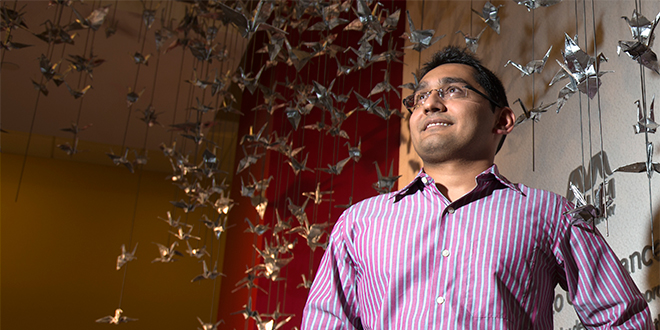
Shrenik Desai is keenly aware of his role in the complex ecosystem of modern-day healthcare delivery.
On one side are millions of cancer patients seeking new hope from the latest life-extending treatments.
On the other side are the pharmaceutical and biotech companies developing, testing, and commercializing those treatments.
In the middle, there are people like Desai, a 2012 graduate of Northeastern University College of Professional Studies, who works in regulatory affairs at Millennium Pharmaceuticals, the oncology division of Japanese drug giant Takeda. Desai and his peers are the people whose efforts largely determine how and when a promising new drug is made available to patients around the world.
“I feel extremely fortunate to be a part of the oncology research community, working every day for the betterment of cancer patients worldwide,” said Desai. “To come to work each day knowing that what we do is making a difference in the lives of so many patients is the greatest feeling one can experience.”
On the face of things, regulatory affairs may seem like an administrative function, but that is far from reality.
Strategic navigation
“Regulatory affairs is all about how you bring a product to market, how you strategically navigate the U.S. Food and Drug Administration (FDA) process,” said Desai. “Every medical product – a device, a drug, a biologic – must follow a strict process to gain FDA approval.”
It takes anywhere from 8 to 12 years for a new drug to clear the rigorous regulatory approval process. If a pharmaceutical company can get a drug patented in the United States, it will typically have exclusive rights for 20 years before it becomes available as a generic drug. Each additional day of commercial availability before a medication reaches the “patent cliff” can be worth millions.
In this challenging environment where failure is the overwhelming norm, drug companies have two essential keys to success. They need to save time, resources and costs by identifying the most promising drug candidates earlier in the development process; and they need to master the regulatory approval process to reduce time-to-market and maximize the limited window of opportunity available to new patented pharmaceuticals.
“The strategic piece of regulatory affairs involves interpreting the dynamic regulatory landscape to explore opportunities for accelerated product development, such as orphan drug, fast track, and breakthrough designations,” said Desai. “Regulatory professionals need to be proactive and forward thinking, providing timely and robust regulatory guidance to help shepherd a drug from the laboratory bench to the patient’s bedside.”
This combination of science and strategy is what first attracted Shrenik Desai to the field.
“I grew up in Gandhinagar, which is the capital of the state of Gujarat in western India,” he recalled. “No one in my family was in the scientific field. But I was always curious about science and learning about new and fascinating things, including how medicines work. As a kid, that interest was initially focused on doctors, but then I realized that it was scientists who bring those new medicines to market.”
Desai attended Rajiv Gandhi University in the state of Karnataka, where he pursued his Bachelor of Science degree in Pharmacy. Graduating with honors, Shrenik Desai began plotting his next career move. The Northeastern College of Professional Studies degree in Regulatory Affairs quickly caught his eye.
“The best thing about Northeastern is the curriculum,” he stated. “Regulatory affairs is divided into three parts: medical devices, drugs, and biologics. Some master’s programs focus only on devices; some just focus on drugs. The Northeastern program is designed to provide exposure to all three.”
When he was accepted into the program, Desai felt some trepidation. He had never been outside India and knew no one in the United States other than a few distant relatives. The College’s resources helped him get acclimated to his new life when he arrived in Boston in 2010 and quickly sharpened his English skills. However, getting used to the Boston climate took some time.
“I’m from a state in India where it has never snowed,” said Desai with a laugh. “During my first winter in Boston, I loved snow because I was seeing it for the first time. People told me, ‘Wait two years and see how much you still love it.’”
Helping the next generation
There were other aspects to being a graduate student in a new country that Desai could only learn from experience, which is why he became active in Northeastern’s International Students and Scholar Institute (ISSI). As an orientation leader, he helped other international students obtain their emigration clearance and complete U.S. documentation requirements, and organized activities to help them ease their transition to life in the United States. Since graduating, he has continued to mentor international students in the master’s program.
Shrenik Desai seemed very much at home as he walked across the Millennium Pharmaceuticals campus in Cambridge, Massachusetts in early winter. Although he had been busy filing an Investigational New Drug (IND) application with the FDA, he was looking forward to his first extended trip to visit his family in warm and sunny India. Even with snow on the ground and temperatures dipping, he didn’t bother to wear a coat.